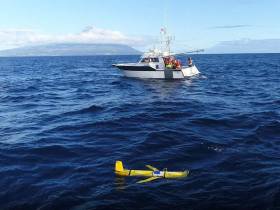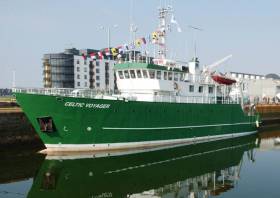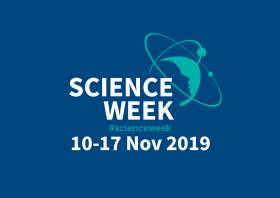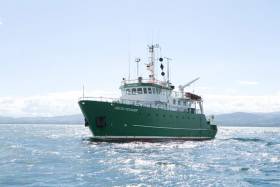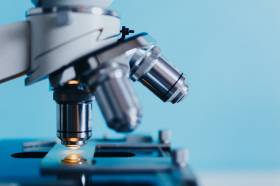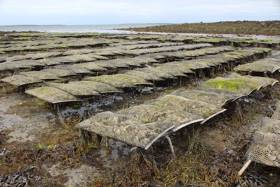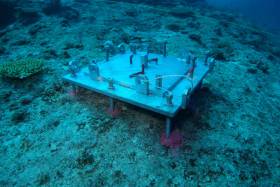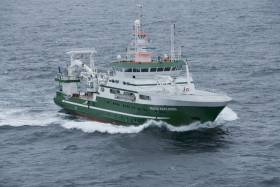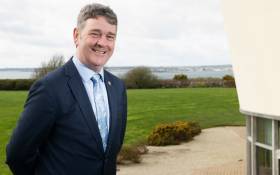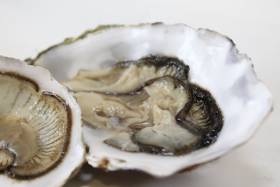Displaying items by tag: Marine Institute
Irish Research Marine Glider Deployed In North Atlantic On New Project
The Marine Institute’s marine glider has been deployed in the North Atlantic as part of a deep ocean marine science research project.
Laochra na Mara can reach depths of 1,000m and collects oceanographic data on conductivity, temperature, depth, fluorescence, turbidity and dissolved oxygen.
The glider was deployed from the RV Águas Vivas as part of the fifth project meeting for the Innovation in the Framework of the Atlantic Deep Ocean (iFADO) project recently held in The Azores, Portugal.
Prior to deployment, the glider was exhibited to the public at the Horta Maritime Terminal where local school students met iFADO team members and viewed several videos about glider operations and missions.
The school students also wrote messages on the glider before it was launched.
“Equipped with a wide variety of sensors, the glider can gather information about ocean temperature, salinity and currents, and transmits this information to shore via satellite,” Thomas Dabrowski of the Marine Institute said.
“Gliders are able to provide real-time data, and provide a better assessment and understanding of our ocean environment.”
Gliders are programmed to surface at designated times and transmit the data collected while at the same time downloading new mission instructions. This two-way communication allows gliders to continually gather information about the most important and diverse regions of our ocean basins 24 hours a day.
Similar to a glider from the United States that was found off Baltimore in 2017, the Slocum glider was recently recovered in the North Atlantic Ocean after 15 days at sea — during which it covered over 250km and performed over 40 deep dives.
The fifth iFADO project meeting gathered 50 participants and partner leads to hear the latest results and discuss future co-operation and follow-up action.
The iFADO project aims to create marine services at regional and sub-regional scale using the EU’s Atlantic waters as a case study. It combines traditional monitoring with cost-effective state-of-the-art technologies such as remote sensing, numerical modelling and emerging observation platforms such as gliders and oceanic buoys.
The Marine Institute is one of 20 partners from Ireland, the UK, France, Portugal and Spain involved in the iFADO project. The project has received funding from the European Union’s Interreg Atlantic Area Programme.
Applications Open For EurofleetsPlus ‘Floating University’ In Cork Harbour
The EurofleetsPlus project is calling for applications from early-stage researchers of marine-related sciences to take part in a ‘Floating University’ on the RV Celtic Voyager next spring.
Applications are open until next Friday 22 November for the scheme co-ordinated in Ireland by the Marine Institute.
Mapping the Ocean Floor: An Introduction to Practical Aspects of Hydrographic Surveying will take place on board the RV Celtic Voyager in Cork Harbour from 19-25 February next year.
Teaching will focus on the operation of multi-beam echosounders and sub-bottom profiling and their applications for mapping and characterising the seabed. Offshore training will be supported by lectures, workshops and online resources.
On completion, participants of the Floating University will be able to demonstrate competence in designing and executing an offshore hydrographic survey, articulate understanding of the principles and methods applied to seabed surveying, as well as practice data acquisition and data processing for multi-beam echosounders and sub-bottom profiler systems.
Instruction will be from expert practitioners from the INFOMAR project with guest lecturers from the Marine Geology Research Group, University College Cork, and the National Institute of Oceanography and Applied Geophysics (OGS) in Italy.
A total of eight places are available for European postgraduate students (students of all nationalities enrolled at European universities) and online applications must be received by next Friday. Details of the Floating University and how to apply can be found HERE.
Marine & Climate Science On Show At Mayo & Galway Science Festivals
Marine science and ocean climate research will be showcased to mark Science Week 2019 at science and technology festivals in Castlebar this coming Sunday 17 November, and Galway next Sunday 24 November.
The Marine Institute will host an interactive stand at the Mayo Science and Technology Open Day which will include a display of corals, mermaid’s purses and live fish species.
Children can identify invertebrates under the microscope and find out more about plastic waste in our oceans. There is also an opportunity to learn more about the research undertaken at the Marine Institute’s facility in Newport, including its involvement in the Bluefin Tuna Data Collection Programme.
Elsewhere, the Galway Science and Technology Festival next weekend will focus on climate action, understanding climate change, and how science and technology can help us create a positive climate impact.
At the Marine Institute stand visitors will learn about the work undertaken by the institute to observe and understand how our ocean is changing.
An Argo float, which collects important data on the temperature and salinity of the ocean, will be on display. There will also be video displays and interactive touch screens on the institute’s involvement in marine biodiversity research.
Among other attractions, visitors will have the chance to see a mini ROV, or remotely operated vehicle, as well as models of Ireland’s marine research vessels the RV Celtic Explorer and RV Celtic Voyager, and how this infrastructure is used for fisheries and oceanographic research.
The Marine Institute stand will also host a competition to win a tour of the RV Celtic Explorer, or an Explorers Seashore Safari lesson for their primary school class.
The Mayo Science and Technology Festival will be held at GMIT Castlebar on Sunday 17 November from 11.30am to 6pm. Galway Science and Technology Festival will take place at the Bailey Allen Hall, NUI Galway on Sunday 24 November from 10am to 6pm.
For more information on activities taking place this week for Science Week 2019, click HERE.
Herring Spawning Stock Survey Off West & North West Coasts This December
The Marine Institute’s Fisheries Ecosystems Advisory Services (FEAS) department will undertake a survey of herring off the West and North West Coasts from 1-10 December.
This survey is the fourth in a time series that is hoped will be developed into a long-term index of spawning/pre-spawning herring in ICES area 6a S/7b, for use in stock assessments in the future.
The overall 6a survey (6a N and 6a S/7b) is part of a collaborative partnership between Ireland, the Netherlands and UK (Scotland) that aims to improve understanding of the individual stock components of herring in 6a and 7b.
Next month’s survey will be conducted by the RV Celtic Voyager (callsign EIQN) using a towed body with two split-beam transducers (38 kHz and 120 kHz). The vessel will be trackable online during the survey.
In total around 1,100 nautical miles of cruise track will be undertaken with a mixture of parallel (spaced at 7.5 and 3.5 nm) and zig-zag transects. The vessel will display appropriate lights and signals.
Night operations will involve the towing of the two split-beam transducer. Fishing will take place opportunistically during daylight hours.
Contact details and co-ordinates of the relevant survey areas are included in Marine Notice No 50 of 2019, a PDF of which is available to read or download HERE.
Researchers Talk Ocean Science At Marine Institute Symposium
The development of an app to help fishermen target areas with fish for which they have quota and avoid fish for which they don’t is just one of the innovations being developed by researchers at the Marine Institute.
The app, presented by Dr Julia Calderwood, is part of the EU-funded DiscardLess project, helping to ensure that the discarding of non-quota fish catches is phased out under the Common Fisheries Policy.
It is just one of many research projects that were presented at the Marine Institute’s Research Symposium on Thursday (24 October).
Seventy researchers from across the institute gathered to present their work, to brainstorm, and to identify ways to work better together.
Researchers presented short overviews and took questions on their work and on the future direction of research at the Marine Institute. There was also a poster session giving further overviews of research.
The institute says its initiative to try to integrate better research across areas such as fisheries science, climate change, oceanography, fish health, seafood safety and ocean chemistry is a critical goal of the its strategy, Building Ocean Knowledge, Delivering Ocean Services.
The Research Symposium featured presentations from principal investigators to PhD students on research projects that support important policy areas for Government. The outputs from a project tracking the migration patterns of bluefin tuna, for example, support key policy areas for the Department of Agriculture, Food & the Marine.
The fate, impact and new approaches to persistent pollutants in the marine environment were also addressed and the outputs of this work support key policy areas for the Department of Housing, Planning and Local Government.
Research that supports the seafood sector was addressed with food safety issues around marine biotoxins being presented. Research into the genetic basis for natural starvation in wild Atlantic salmon was presented which will, through manipulation of diet and temperature, help to reduce the time taken for farmed fish to reach a stage of maturity where they can go out to sea cages, thus reducing grow-out time and costs for the salmon farmer.
Research and innovation is a key component of the Marine Institute’s Strategic Plan 2018-2022, and is aligned to the provision of scientific advice and services.
New Marine Institute chief executive Dr Paul Connolly explained the thinking behind the Research Symposium: “The Marine Institute provides essential scientific evidence and advice to Government and to stakeholders to ensure that we are sustainably managing our marine resources and our extensive maritime territory, which is about 10 times the size of our landmass.
“Our research is central to providing the knowledge we need to inform policy and to address challenges such as climate change and ocean pollution while helping to build sustainable maritime sectors such as aquaculture, ocean renewable energy and marine and coastal tourism.”
The Marine Institute Research Symposium is intended to be an annual event, forming part of the efforts being made to deliver knowledge and services that are safeguarding our ocean resources and supporting a healthy and sustainable ocean economy in Ireland.
Workshop Hears Latest Research On Shellfish Safety
More than 90 shellfish producers and processors, scientists, agencies and stakeholders attended the 11th Shellfish Safety Workshop earlier this month to discuss the latest advances in the field in Ireland.
The workshop, which took place on Tuesday 8 October in the Radisson Blu Hotel Athlone, was hosted by the Marine Institute and co-sponsors Food Safety Authority of Ireland, Sea Fisheries Protection Authority and Bord Iascaigh Mhara.
The event offered an opportunity to exchange information on the latest research and information on the cause and control of shellfish products harvested and farmed around Ireland's coast.
Speakers included Dr Conor Graham, of GMIT Marine and the Freshwater Research Centre, on the development of the world’s first scientific-based shellfish traceability tool, as previously reported on Afloat.ie.
Other speakers included Dr Monika Dhanji Rapkova, of the Centre for Environment, Fisheries and Aquaculture Science, on the learnings on regulated and emerging biotoxins in British shellfish.
Dr Eileen Bresnan (Marine Scotland Science) presented a talk on the regional distribution of harmful algal events in North Atlantic Area. Dave Clarke of the Marine Institute also talked about the insights and perspectives on monitoring algal and biotoxin events in Irish coastal waters from the past 20 years.
Micheál O'Mahony of the Sea Fisheries Protection Authority presented on the recently published European baseline survey of norovirus in oysters, while Dr Sinéad Keaveney (Marine Institute) discussed the survey in the Irish context.
There were also a series of flash presentations from representatives of the Marine Institute, Bord Iascaigh Mhara, Sea Fisheries Protection Authority, Food Safety Authority of Ireland, Dublin City University, Sligo Institute of Technology and Health Services Executive.
The proceedings of the workshop are currently being compiled for publication and in the coming weeks will be available for download from the Marine Institute’s Open Access Repository.
An ‘Irish ocean observing system’ is among six research projects to receive €25 million in funding through the Science Foundation Ireland (SFI) Research Infrastructure Programme.
Innovation Minister Heather Humphreys yesterday (21 October) announced the investment as part of Future Jobs Ireland that will be distributed among the six infrastructure projects “in areas of strategic priority across a variety of disciplines”.
Mr Michael Gillooly of the Marine Institute is lead on the EirOOS Irish Ocean Observing System, a component of the European Ocean Observing System (EOOS) that aims to further scientific and technical research capacity in key areas such as sea level science, ocean circulation and carbon sequestration, allowing us to better understand the connection between Ireland and the Atlantic.
Announcing the awards, Minister Humphreys said: “The quality of research being undertaken in Ireland today is testament to our world-class research community. This talent combined with the support provided through programmes like this one maintains our reputation as a great place to do business and work.
“The successful projects are at the cutting edge of innovation and are helping us to achieve our goal of preparing now for tomorrow's world.”
The SFI Research Infrastructure Programme aims to ensure Irish researchers have the capacity to apply for international funding opportunities, including Horizon 2020 funding calls.
Additionally, the programme eases inter-institutional sharing of national research infrastructure, especially for institutes of technology, as well as effective collaborations with industry.
Welcoming the investment in EirOOS, new Marine Institute chief executive Dr Paul Connolly said: “Sustainably managing our oceans and understanding the impacts of ocean and climate change, requires increased observations on and within the ocean.
“These observations underpin research and advice to support policy makers in sustainably managing our oceans and also in developing adaptation and mitigation plans for climate change impacts.
“The investment in the EirOOS infrastructures will enable enhanced ocean observation and underpin forecasting and modelling in the marine area.”
Annual Irish Groundfish Survey Commences End Of This Month
The annual Irish Groundfish Survey (IGFS 2019) will take place off the North, West and South Coasts for six weeks from 31 October.
Carried out by the Marine Institute, the IGFS is a demersal trawl survey consisting of around 170 fishing hauls, each of of 30 minutes’ duration, in ICES areas VIa, VIIb, VIIg and VIIj.
As part of the requirements for the 2019 survey, fishing will take place within a 2-nautical-mile radius of indicated positions.
The survey will be conducted by the RV Celtic Explorer (callsign EIGB) which will display appropriate lights and signals.
The vessel will be towing a high headline GOV 36/47 demersal trawl during fishing operations.
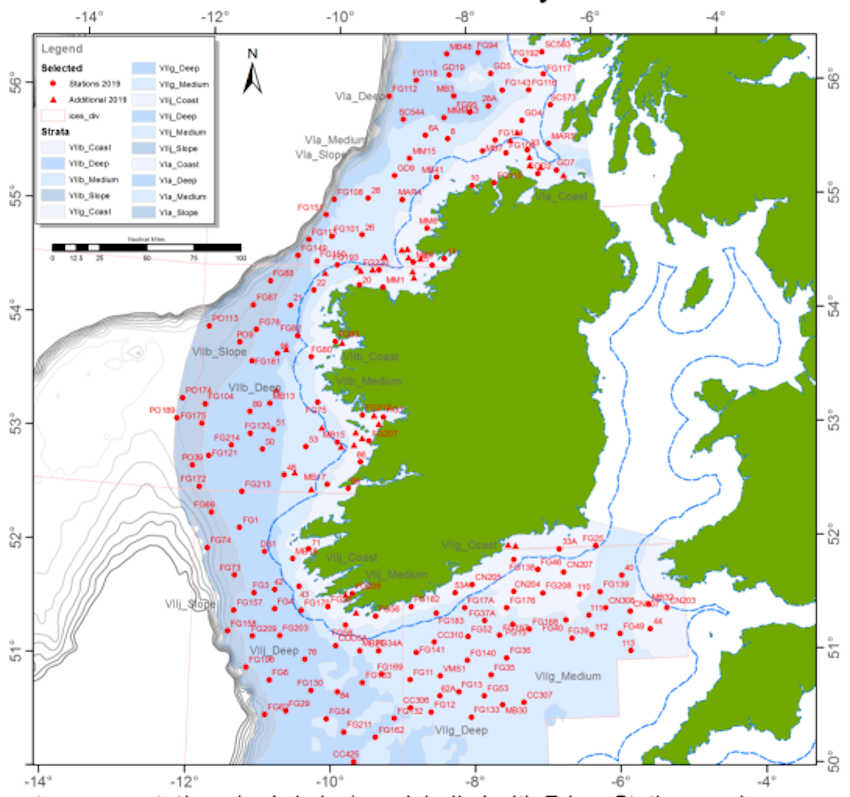
Co-ordinates and approximate locations of these hauls are included in Marine Notice No 47 of 2019, a PDF of which is available to read or download HERE.
The Marine Institute requests that commercial fishing and other marine operators keep a 2nm area around the tow mid-points clear of any gear or apparatus during the survey period between Thursday 31 October and Friday 14 December.
This survey follows the annual Irish Anglerfish and Megrim Survey which was conducted off the West South West and South Coasts in March.
Peter Heffernan Says Farewell to the Marine Institute
Dr Heffernan has served as the CEO of the Marine Institute since 1993 and has held a highly successful role in building and leading the organisation. The semi-state agency has grown from a staff of one to 230, which now incorporates the Institute’s headquarters in Co Galway, the Newport Research Facility in Co Mayo and the Irish Maritime Development Office (IMDO) in Dublin.
Chairman of the Marine Institute Dr John Killeen said, “As CEO, Dr Heffernan has overseen tremendous growth. He has played a fundamental role in developing Ireland’s ocean research capacity, increasing collaboration in marine research and innovation in Europe, as well as driving sustainable development across a range of maritime sectors. Dr Heffernan leaves a lasting-legacy and has set the Institute on course to become a global leader in ocean knowledge. On behalf of the Board and Marine Institute staff, I thank Dr Heffernan for his dedication, strategic direction and leadership as CEO and wish him all the best as he begins a new voyage.”
As CEO of the Institute, Dr Heffernan has overseen the arrival of Ireland’s two purpose-built marine research vessels, the RV Celtic Voyager in 1997 and the RV Celtic Explorer in 2003. The RV Celtic Voyager has provided a platform for scientists to undertake essential fisheries research, environmental monitoring, seabed mapping, oceanographic work, data buoy maintenance and student training. The RV Celtic Explorer has played a vital role in Ireland’s fisheries research, placing Ireland in a much stronger position to propose effective conservation measures for fish stocks and support the sustainability of the Irish fishing industry. A new state-of-the-art marine research vessel is also scheduled for completion in 2022, which will mark a major milestone in the Marine Institute’s effort to provide world-class marine scientific advice and services.
In 2009, Dr Peter Heffernan instigated the development of the Inter-Department Marine Coordination Group (MCG). Chaired by the Minister for Agriculture, Food and Marine, the group brought together representatives of departments with an involvement in marine and maritime issues to coordinate inter-departmental action. The MCG produced Ireland’s first integrated marine plan for Ireland Harnessing Our Ocean Wealth in 2012 which set out two targets - increase the value of Ireland’s ocean wealth to 2.4% of GDP by 2030 and double the turnover from our ocean economy (from €3.2 billion) to exceed €6.4 billion by 2020. In 2018, Ireland’s ocean economy is estimated to have a turnover of €6.2 billion and GVA estimated at €4.2 billion equivalent to 2% of GDP.
In 2013, Dr Heffernan acted as an inspiration and Irish EU Presidency ambassador for the creation of the Atlantic Ocean Research Alliance (AORA) with the signing of the Galway Statement on Atlantic Ocean Cooperation between Canada, the European Union and the United States of America. Six years on and AORA has been recognised as an outstanding success story in the Atlantic area and an exemplar of international science diplomacy. To date, AORA has achieved an investment from Horizon 2020 EU funding of more than €140 million to support research in the Atlantic Ocean.
Ireland is now considered a world leader in the field of seabed mapping through the expertise of the Geological Survey Ireland and the Marine Institute. The Irish National Seabed Survey (INSS), which began in 1999 remains one of the largest seabed mapping projects ever undertaken in the world. Now known as the INFOMAR programme and scheduled for completion in 2026, Ireland will become the first nation in the world to have comprehensively mapped its entire seabed territory.
Research and Innovation are central to the role and mission of the Marine Institute. A Marine Knowledge, Research and Innovation Strategy for Ireland, ‘Sea Change’ was prepared by the Marine Institute and launched in 2007. A new National Marine Research and Innovation Strategy 2021 was also prepared by the Marine Institute in 2017, to help ensure Ireland maintains its position at the forefront of marine research in Europe.
The Marine Institute has achieved an outstanding success rate of over 40% in funding bids to the European Union’s Horizon 2020 programme. The total funding approved to date under this programme has now surpassed the €8m target, 18 months ahead of schedule. The work of the Marine Institute has seen significant collaborations with industry and other research centres and universities in Ireland, Europe and international stakeholders, strengthening Ireland’s ability in providing a foundation for applied research and innovation.
Dr Heffernan was recently selected as a member of the European Commission’s Mission Board for Healthy Oceans, Seas, Coastal and Inland Waters, one of five major research missions of Horizon Europe, the EU Research and Innovation programme (2021 – 2027). Dr Heffernan will be one of 15 experts on the Mission Board which will identify the first possible specific missions on healthy oceans by the end of 2019.
Studies carried out by a research team led by Galway-Mayo Institute of Technology (GMIT) have resulted in the development of the world's first scientific-based shellfish traceability tool.
This unique tool used ‘trace elemental fingerprinting’ of shellfish soft tissues and shells to identify the harvest location of blue mussels and king scallops with a 100% success rate — including mussels reared from two sites located just 6km apart within the one bay.
The technique used not only correctly identified the site of harvest of scallops, but was also able to distinguish between harvesting events just six weeks apart, both with 100% success.
The Marine Institute provided scientific advice and input into the initial stages of the research project, as well as providing samples of mussels and scallops for the studies led by Dr Conor Graham of the GMIT Marine and Freshwater Research Centre in collaboration with Dr Liam Morrison of Earth and Ocean Sciences and the Ryan Institute, NUI Galway.
The research was also conducted in association with the Food Safety Authority of Ireland, European Food Safety Authority and University College Dublin.
Lead scientist Dr Graham said: “In recent years consumers have become more food-conscious, seeking traceability of produce, and while such tools exist for agriculture, until now no scientifically based system existed to trace both farmed and wild shellfish produce to their source.
“The aquaculture of shellfish such as mussels and oysters and the wild fisheries for scallops, razorfish and clams is a multi-million industry in Ireland supporting thousands of jobs in rural maritime communities around our coasts. This research aimed to create the world’s first bivalve shellfish scientifically based traceability tool for Irish produce to promote this ecologically sustainable food.”
Trace elemental fingerprinting is somewhat similar to genetic analyses, the Marine Institute explains, except that instead of identifying the variation in a number of genes to create a unique genetic identifier, it analyses how large numbers of trace elements contained naturally within the flesh and shells of shellfish vary uniquely according to growing sites.
Although the shells of mussels and scallops are composed primarily of calcium carbonate, other elements are incorporated into their shells at relatively low levels as they grow, which is determined by the bioavailable concentrations of these elements in the surrounding water column in which the shellfish live.
The research was recently published in two scientific papers (on king scallops and blue mussels, respectively) in international peer-reviewed journal Science of the Total Environment.
Details will also be presented by Dr Graham at the Marine Institute’s 11th Shellfish Safety Workshop next Tuesday 8 October at the Radisson Blu Hotel in Athlone. The event will include presentations from representatives from a variety of state agencies, academic and research institutions and the shellfish industry.
The Marine Institute is the national reference laboratory in Ireland for the monitoring of marine biotoxins and microbiological/viral contamination of bivalve shellfish, and provides this information to the competent authorities under legislative and statutory requirements.


























